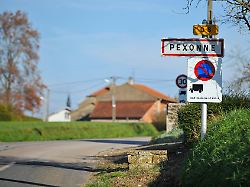“We share your pain”
SS officer’s grandsons commemorate victims of Nazi raids
08/26/2023 11:44 am
In August 1944, German soldiers invaded the French village of Pexonne and abducted dozens of villagers. The action is commanded by SS-Haupsturmfuhrer Erich Otto Wenger. Now, for the first time, Wenger’s grandchildren are coming to town to take part in a memorial service for the victims of the crime.
When people in Pexonne in eastern France commemorate a fateful Nazi raid in the small town for the 79th time this Sunday, many will look at three unfamiliar guests. For the first time, three grandchildren of SS Hauptsturmfuhrer Erich Otto Wenger, who ordered the fatal raid, lined up among the residents as an expression of regret. Of the 112 abducted villagers, almost all men, around 80 were deported to concentration camps by the Germans, only a few returned alive. After the end of the Second World War, Wenger made a career for himself at the Federal Office for the Protection of the Constitution, until his past was publicly revealed in 1963.
The grandchildren of the SS man do not want to speak at the commemoration in Lorraine. They refused that a national television broadcaster would arrive on Sunday. Photographers are present when the wreath is laid together after a service. “We don’t come to apologize, we are not guilty, but we can share the grief,” said granddaughter Anne in advance. “A gesture as discreet as possible,” she said. “We share your pain and we are sorry.” A sister and a cousin are coming with her to the commemoration with one of his daughters.
Her mother had already turned against her father, married a Frenchman and then lived in the neighboring country, said Anne. She herself grew up in France and is still at home there today. At school she was teased because of her German origins. “We knew that the grandfather was a Nazi.” But they didn’t know more than that he was deployed in Paris. Grandpa never came to France, she remembers. A cousin started investigating a while ago. A brother then made the connection between the grandfather and the raid in Pexonne – a town with currently around 340 inhabitants west of Strasbourg.
Thousands of people kidnapped
During their further search, the descendants of the perpetrator then came across a descendant of one of the victims – Guillaume Maisse, whose grandfather died in the concentration camp at the time and who has been commemorating the raid with an association since 2017. “Their first words on the phone were that they wanted to come to a memorial,” Maisse said of the first call he received from Anne. This wish was well received in the club – beyond that, he indicated, there were also frowns in town. His suggestion to hoist the German flag in addition to the French one in view of the human gesture on Sunday was not taken up.
“A few years ago, a German school class dealt with the raid in Pexonne,” said Maisse. Apart from that, there had been no great interest from Germany in what happened in Pexonne on August 27, 1944. After the liberation of Paris, the German troops were in retreat, regrouped in Nancy and advanced against the French Resistance in the border region. Under the cynical code word “Aktion Waldfest”, the Wehrmacht, SS and Gestapo plundered and devastated places in Lorraine and deported thousands of people.
Wenger made a career for the protection of the constitution
Forces moved into Pexonne and two neighboring towns under Wenger’s command. Of the 109 men and three women from Pexonne who had been rounded up, the youngest were soon released, but 9 were shot by the Germans, and 79 arrived at the Mauthausen concentration camp after several stages. There they were used as forced laborers in armaments factories in the area. According to Maisse, only 18 of them survived the inhumane conditions by the end of the war. For dozens of families, after weeks of fruitless waiting, it was clear: the husband, father or relatives would not return.
Wenger survived a temporary French prisoner of war and British internment under false identity. In 1950 he came to the Federal Office for the Protection of the Constitution, still under the false name “Eduard Wolters”. Only when the media uncovered his Nazi past in 1963 was he no longer tenable for the protection of the constitution. He was transferred to another agency. He was no longer held accountable for his actions in France.
